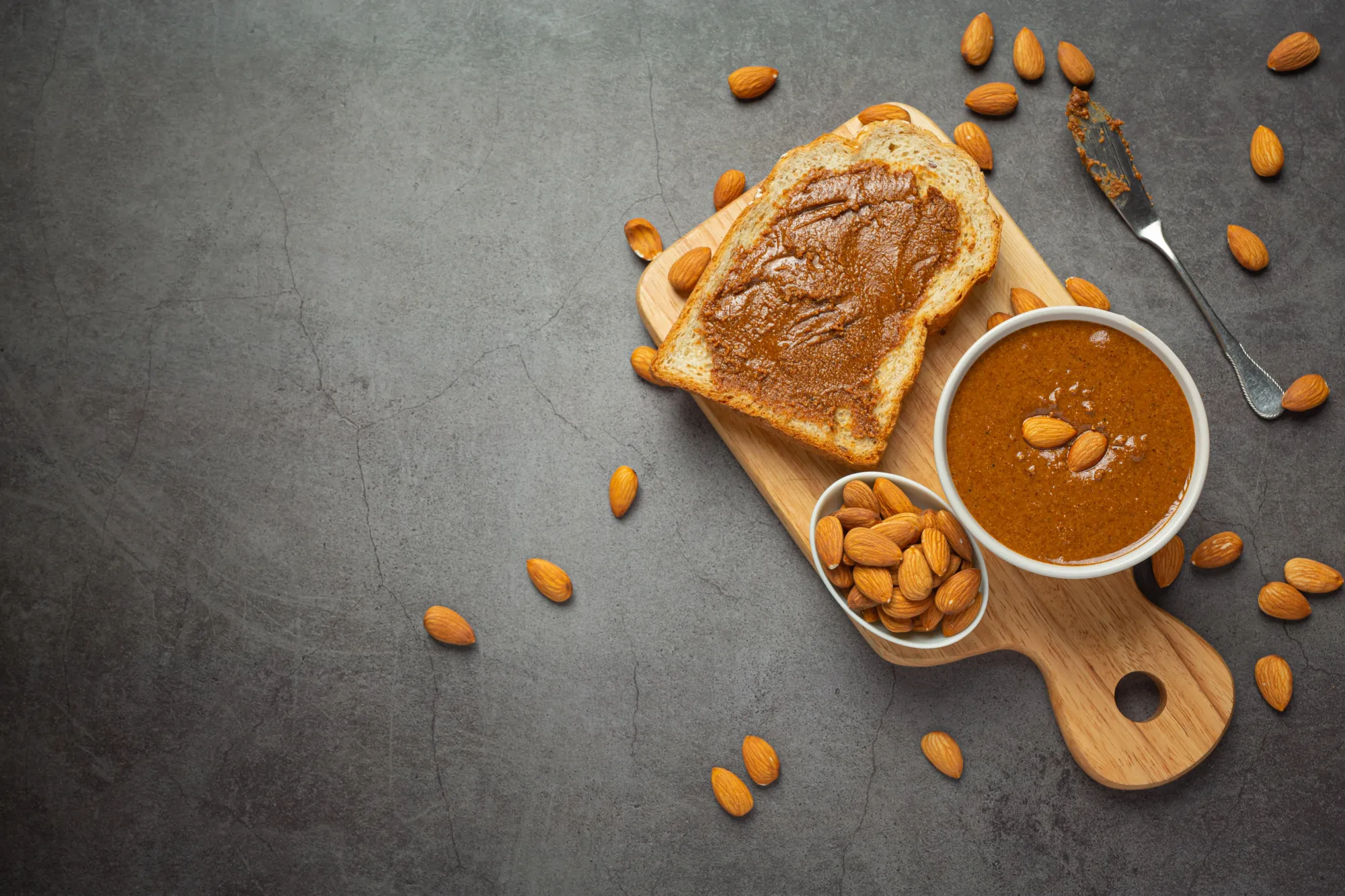Dogs love to eat human food, and as a pet owner, you may be tempted to share your favorite snacks with your furry friend. Almond butter is a popular food item that many people enjoy, but can dogs have almond butter?

The short answer is yes, dogs can eat almond butter, but there are some important things to consider before feeding it to them. Almond butter is made from ground almonds, which are a good source of protein, healthy fats, and fiber. These nutrients are also beneficial for dogs, making almond butter a healthy treat option.
However, it is important to note that almond butter should be given to dogs in moderation. Too much almond butter can lead to weight gain and digestive issues, such as diarrhea and vomiting. Additionally, some dogs may be allergic to almonds, so it is important to monitor your dog for any signs of an allergic reaction after feeding them almond butter.
Can Dogs Have Almond Butter?
Almond butter has become a popular alternative to peanut butter for many people. It is a great source of protein, healthy fats, and vitamins. However, when it comes to dogs, the question arises: can they have almond butter?
The answer is yes, dogs can have almond butter, but it should be given in moderation. Almond butter is high in fat and calories, which can lead to obesity in dogs if given in excess. Additionally, some dogs may have an allergic reaction to almonds, so it is important to monitor your dog for any signs of an allergic reaction.
It is also important to note that dogs should not be given whole almonds to eat. Almonds can be a choking hazard and can also cause digestive issues if not chewed properly.
When giving your dog almond butter, it is best to choose a natural, unsalted variety without any added sugars or artificial sweeteners. These additives can be harmful to dogs and can cause digestive issues or other health problems.
Overall, while almond butter can be a healthy treat for dogs in moderation, it is important to be mindful of the potential risks and to choose a high-quality, natural variety.
Nutritional Profile of Almond Butter
Almond butter is a popular nut butter made from ground almonds. It is often used as a healthier alternative to peanut butter, as it is lower in saturated fats and higher in certain nutrients. Here is a breakdown of the nutritional profile of almond butter:
Fat Content and Types
Almond butter is high in fat, with approximately 50-60% of its calories coming from fat. However, the majority of this fat is unsaturated, which is considered to be a healthier type of fat. Specifically, almond butter is high in monounsaturated fats, which have been linked to a reduced risk of heart disease.
Protein and Amino Acids
Almond butter is also a good source of protein, with around 6-7 grams of protein per serving. It contains all nine essential amino acids, which are the building blocks of protein that the body cannot produce on its own.
Vitamins and Minerals
Almond butter is a good source of several important vitamins and minerals. It is particularly high in vitamin E, which is a powerful antioxidant that helps protect the body from damage caused by free radicals. Additionally, almond butter contains significant amounts of magnesium, phosphorus, and potassium, which are important for bone health, energy production, and muscle function.
Overall, almond butter is a nutritious food that can be a healthy addition to a balanced diet. However, it is important to keep in mind that it is also high in calories, so it should be consumed in moderation as part of an overall healthy eating pattern.
Health Benefits of Almond Butter for Dogs

Almond butter is a delicious and nutritious treat that many dog owners love to share with their furry friends. Not only is it a great source of protein and healthy fats, but it also contains several vitamins and minerals that can benefit a dog's health in various ways.
Skin and Hair Health
Almond butter is rich in vitamin E, which is a powerful antioxidant that can help improve skin and hair health in dogs. This nutrient helps to protect cells from damage caused by free radicals, which can contribute to premature aging and other health problems. Vitamin E can also help to moisturize and nourish the skin, reducing dryness and irritation. Additionally, the healthy fats found in almond butter can help to improve the overall quality of a dog's coat, making it shinier and softer.
Eye and Liver Function
Almond butter is also a good source of vitamin A, which is essential for healthy eye function in dogs. This nutrient helps to maintain the health of the retina and other structures in the eye, reducing the risk of vision problems and other eye-related issues. Additionally, vitamin A plays an important role in liver function, helping to support the liver's ability to detoxify the body and maintain overall health.
Overall, almond butter can be a healthy and delicious addition to a dog's diet. However, it is important to remember that moderation is key when it comes to feeding dogs human foods. Too much almond butter can lead to digestive upset and weight gain, so it is best to offer it as an occasional treat rather than a regular part of their diet.
Potential Risks of Feeding Almond Butter to Dogs
When it comes to feeding your dog almond butter, there are some potential risks that you should be aware of. While almond butter can be a tasty treat for your furry friend, it is important to understand the potential risks associated with feeding it to them.
Choking Hazards
One of the biggest risks associated with feeding your dog almond butter is the risk of choking. Almond butter can be quite thick and sticky, which can make it difficult for your dog to swallow. This is especially true if your dog is prone to gulping their food without chewing it properly.
Allergic Reactions
Another potential risk of feeding your dog almond butter is the risk of an allergic reaction. While almonds themselves are not toxic to dogs, some dogs may be allergic to them. If your dog has never had almond butter before, it is important to start with a small amount and monitor them closely for any signs of an allergic reaction.
Gastrointestinal Distress
Feeding your dog too much almond butter can also lead to gastrointestinal distress. Almond butter is high in fat, which can be difficult for some dogs to digest. This can lead to vomiting, diarrhea, and other gastrointestinal issues.
Pancreatitis Risk
Finally, feeding your dog almond butter can also increase their risk of developing pancreatitis. Pancreatitis is a condition in which the pancreas becomes inflamed, which can be very painful for your dog. Almond butter is high in fat, which can increase the risk of pancreatitis in some dogs.
Overall, while almond butter can be a tasty treat for your dog, it is important to understand the potential risks associated with feeding it to them. If you do decide to feed your dog almond butter, it is important to do so in moderation and to monitor them closely for any signs of an adverse reaction.
Toxic Ingredients in Some Almond Butters
While almond butter can be a healthy treat for dogs, it is important to be aware of the potential dangers that some almond butters may pose. Some almond butters contain toxic ingredients that can be harmful to dogs. In this section, we will discuss two of the most common toxic ingredients found in almond butter.
Xylitol Poisoning
Xylitol is a sugar substitute that is often used in sugar-free gum, candy, and other products. It is also sometimes used in almond butter as a sweetener. However, xylitol is extremely poisonous to dogs and can cause a rapid insulin release, leading to hypoglycemia (low blood sugar). Symptoms of xylitol poisoning in dogs include vomiting, loss of coordination, seizures, and even death.
It is important to always check the ingredients list on almond butter before giving it to your dog. If xylitol is listed, do not give it to your dog and seek veterinary attention immediately if your dog has ingested any xylitol.
Excessive Salt and Sugar
Some almond butters may contain excessive amounts of salt and sugar, which can be harmful to dogs. Excessive salt intake can lead to dehydration, vomiting, diarrhea, and even death. Similarly, excessive sugar intake can lead to obesity, dental problems, and other health issues.
When selecting an almond butter for your dog, it is important to choose one that is low in salt and sugar. Always read the label and look for almond butter that is specifically formulated for dogs or that has minimal added ingredients.
In conclusion, while almond butter can be a healthy treat for dogs, it is important to be aware of the potential dangers that some almond butters may pose. Always check the ingredients list and choose almond butter that is free of xylitol and low in salt and sugar to keep your furry friend safe and healthy.
Safer Alternatives to Almond Butter

When it comes to feeding dogs, it is important to ensure that they are not given anything that could potentially harm them. While almond butter may seem like a healthy and tasty treat for dogs, it is not recommended due to the high fat content and potential risk of choking. However, there are several other nut butter options that are safer for dogs to consume.
Peanut Butter and Dogs
Peanut butter is a popular choice for dog owners as it is widely available and dogs love the taste. It is also a good source of protein and healthy fats. However, it is important to choose a peanut butter that does not contain xylitol, a sugar substitute that is toxic to dogs. Natural peanut butter without added sugar or salt is the best option for dogs.
Other Nut Butters
There are several other nut butter options that can be given to dogs in moderation. Macadamia butter, cashew butter, and hazelnut butter are all safe for dogs to consume as long as they are free from added sugar, salt, and other harmful ingredients. However, it is important to note that these nut butters are high in fat and calories, so they should only be given as an occasional treat.
Overall, while almond butter may seem like a healthy and tasty option for dogs, there are safer alternatives available. Peanut butter and other nut butters can be a great source of protein and healthy fats for dogs, but it is important to choose options that are free from harmful ingredients and only give them in moderation.
Choosing the Right Almond Butter
When it comes to choosing the right almond butter for your furry friend, it's important to look for options that are organic and natural. Not all almond butter is created equal, and some brands may contain additives or preservatives that could be harmful to your dog.
Organic and Natural Options
Organic almond butter is made from almonds that have been grown without the use of pesticides or synthetic fertilizers. This means that the almonds are free from harmful chemicals that could potentially harm your dog's health.
Natural almond butter is made from almonds that have not been processed with any additives or preservatives. This means that the almond butter is free from any artificial flavors or colors that could be harmful to your dog.
When choosing an almond butter for your dog, it's important to read the label carefully. Look for brands that use high-quality, organic and natural ingredients. Avoid brands that contain added sugars, salt, or other additives that could be harmful to your dog's health.
In addition to reading the label, it's also important to consider the texture of the almond butter. Some dogs may prefer a smooth texture, while others may prefer a chunky texture. It's best to experiment with different textures to see what your dog likes best.
Overall, choosing the right almond butter for your dog is all about finding a brand that uses high-quality, organic and natural ingredients. By doing so, you can ensure that your furry friend is getting the best possible nutrition without any harmful additives or preservatives.
How to Safely Introduce Almond Butter to Your Dog
Introducing new foods to your dog's diet can be exciting, but it's important to do so safely. Almond butter can be a tasty and healthy treat for your furry friend, but there are a few things to keep in mind before feeding it to them.
Firstly, it's important to consult with your vet before introducing any new foods to your dog's diet. Your vet can advise you on whether almond butter is safe for your dog based on their age, weight, and overall health.
When introducing almond butter to your dog, start with a small amount and observe their reaction. Some dogs may have allergies or sensitivities to nuts, so it's important to watch for any signs of an allergic reaction such as vomiting, diarrhea, or itching.
It's also important to choose a high-quality almond butter that does not contain any added sugars or artificial sweeteners. These can be harmful to your dog's health and can lead to obesity and other health problems.
If you have a puppy, it's especially important to be cautious when introducing new foods to their diet. Puppies have delicate digestive systems and can easily become sick from new foods. It's best to wait until your puppy is at least six months old before introducing almond butter or any other new foods.
In summary, almond butter can be a healthy and tasty treat for your dog when introduced safely and in moderation. Consult with your vet, start with small amounts, choose a high-quality brand, and watch for any signs of an allergic reaction or digestive issues.
Homemade Almond Butter Dog Treats

Making homemade dog treats can be a fun and rewarding activity for both you and your furry friend. If your dog enjoys almond butter, why not try making some homemade almond butter dog treats?
To make almond butter dog treats, start by mixing together almond butter, whole wheat flour, and eggs to form a dough. Roll the dough out and use cookie cutters to cut out shapes. Place the treats on a baking sheet and bake them in the oven until they are golden brown.
Almond butter is a good source of protein and healthy fats for dogs, but it is important to remember that it should be given in moderation. Too much almond butter can lead to weight gain and digestive issues. It is also important to choose a natural almond butter that does not contain added sugars or artificial ingredients.
When making homemade dog treats, it is important to avoid using ingredients that are toxic to dogs, such as chocolate, raisins, and grapes. Always check with your veterinarian before introducing new foods to your dog's diet.
Overall, homemade almond butter dog treats can be a healthy and tasty snack for your furry friend. Just remember to use moderation and choose quality ingredients.
Frequently Asked Questions (FAQs)
- Is almond butter safe for dogs to consume?
- Almond butter is safe for dogs to consume in moderation. However, it's important to note that almonds are high in fat, which can lead to weight gain and pancreatitis in dogs if consumed in excess. Additionally, some dogs may be allergic to almonds, so it's important to monitor your dog for any signs of an allergic reaction after consuming almond butter.
- Can almond butter be used to help with canine constipation?
- Almond butter may be used to help with canine constipation due to its high fiber content. However, it's important to consult with your veterinarian before using almond butter as a remedy for constipation, as there may be underlying health issues that need to be addressed.
- What are the differences between almond butter and peanut butter for dogs?
- Almond butter and peanut butter are similar in terms of nutritional value, but there are some differences to consider. Almond butter is higher in fiber and lower in saturated fat than peanut butter. Additionally, some dogs may be allergic to peanuts, so almond butter may be a better alternative for those dogs.
- Are there any risks associated with dogs eating almond butter containing palm oil?
- Some almond butter brands may contain palm oil, which has been linked to deforestation and habitat destruction for endangered species. While palm oil itself is not toxic to dogs, it's important to consider the environmental impact of the products you purchase for your pet.
- What should I do if my dog accidentally eats almond butter?
- If your dog accidentally eats almond butter, monitor them for any signs of an allergic reaction or gastrointestinal distress. If you notice any concerning symptoms, contact your veterinarian immediately.
- How can I safely incorporate almond butter into my dog's diet?
- Almond butter can be safely incorporated into your dog's diet as an occasional treat or as a supplement to their regular meals. However, it's important to keep portions small and to choose a brand that does not contain added sugars or artificial ingredients. As with any new food, it's important to introduce almond butter slowly and monitor your dog for any adverse reactions.




